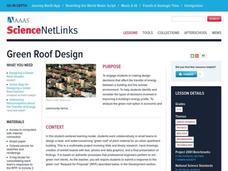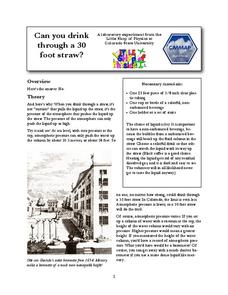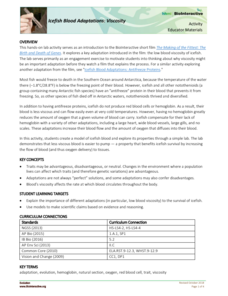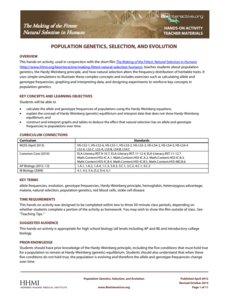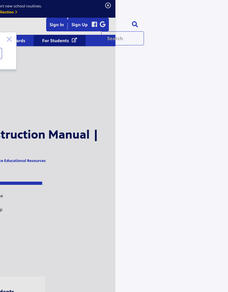Flipping Physics
AP Physics 1: Mechanical Waves Review
Ride the wave to a successful exam! Review everything AP Physics pupils will need to know about mechanical waves for the AP exam with a concise, engaging, and accurate video. A wonderful way to review before the exam.
NOAA
Ocean Acidification
If tap water is more acidic than ocean water, why are we so concerned about ocean acidification? The third installment of a 23-part NOAA Enrichment in Marine sciences and Oceanography (NEMO) program focuses on carbon dioxide levels in...
Urbana School District
Forces
Is your class struggling with Newton's Second Law? Then show them a presentation that covers everything physics scholars need to know about forces. Starting with gravity, the slides focus on Newton's Laws of Motion, and end with an...
Science NetLinks
Green Roof Design
Green roofs aren't just eco-friendly — they are literally green with trees. Groups learn about the concept of green roofs in order to be able to design one. The groups design a 5,000-square-foot green roof for a fictional apartment row...
Chicago Botanic Garden
Greenhouse Gas Emissions – Natural and Human Causes
Part three in the series of seven has pupils discussing the different greenhouses gases, learning about the carbon cycle, and then watching a short video about the carbon cycle. Based on their knowledge, individuals complete a greenhouse...
Chicago Botanic Garden
Are Global CO2 Levels Changing?
According to the Mauna Loa observatory, carbon dioxide levels increased by 3 ppm in our atmosphere between 2015–2016. Individuals analyze carbon dioxide data from around the world and then share this with a home group in lesson three of...
National Wildlife Federation
Hot, Hotter, Hottest: Extreme Weather's Impact on Our Resources
How dry is it? It's so dry, the river only runs twice a week! Through an analysis of maps and discussions, pairs learn about droughts across the United States in the ninth of 12 lessons. They then read about, answer questions, analyze...
Columbus City Schools
Asexual and Sexual Reproduction
Can you name a type of reproduction that produces no variation in the offspring? The multimedia lesson covers both sexual and asexual reproduction through videos and discussions. It includes topics such as genetic modification, meiosis,...
Colorado State University
Can You Drink Through a 30 Foot Straw?
Drinking straws are a pretty simple device ... or, are they? Explore the possibility of sipping a beverage 30 feet away with an engaging activity that's sure to keep pupils guessing. Just place a long piece of plastic tubing in a glass,...
Howard Hughes Medical Institute
Icefish Blood Adaptations: Viscosity
Most fish freeze to death when the water is too cold, yet some fish live in the Southern Ocean where the water is often below freezing. Scholars use two models representing the blood from most fish versus the blood from Antarctic fish....
Howard Hughes Medical Institute
Population Genetics, Selection, and Evolution
The Hardy-Weinberg principle states that alleles and genotypes remain constant in the absence of evolutionary influences. Scholars complete a simple hands-on activity applying the Hardy-Weinberg principle to sample data. They observe how...
Howard Hughes Medical Institute
Pulse Chase Primer: The Meselson-Stahl Experiment
Experimental design can make or break an experiment. Young scholars analyze the pulse-chase analysis procedure by studying the Meselson-Stahl experiment. Using a video presentation, they discover how the pulse-chase analysis led to the...
Curated OER
Friction
Students are introduced to the concept of friction. Using that information, they discover ways in which friction can be useful. They participate in different activities to see fricition in action. They complete a grid worksheet and...
Curated OER
Astrology: Fact Or Fiction?
High schoolers investigate the concept of astrology and how it evolved from history. They use the Zodiac in order to find the location of constellations in the night sky. The differences between astrology and astronomy are compared and...
Discovery Education
Potential and Kinetic Energy
Introduce your classes to potential and kinetic energy with a presentation that would be perfect for a flipped classroom. The resource includes definitions and practice problems for both types of energy.
PBS
DNA 101: Life's Instruction Manual | UNC-TV Science
Unravel the DNA molecule in just over a minute! Future geneticists listen and watch a video exploring DNA's structure, function, and the interaction of the genes and proteins that decode and interpret the complex molecule. Scholars...
Curated OER
Barriers to Change: The Myths about Vehicle Idling
Students have the opportunity to confront some of the most common misconceptions that surround vehicle idling, and employ the concept of social marketing to initiate change. The goal is to give students an appreciation of the impact of...
Curated OER
Bat's a Fact
Second graders investigate the truths and misconceptions associated with bats. By illustrating the characteristics and uniqueness of these often feared and misunderstood creatures, 2nd graders increase their awareness of these nocturnal...
Curated OER
Sea Secrets
Students study the following: For centuries, people have been challenged by the mysteries that lie beneath the blue depths of our ocean planet. Very little was known about the ocean until late in the nineteenth century, although nearly...
Curated OER
Photometry
Students examine blackbody radiation and light wavelengths. Students research the various types of electromagnetic spectrum. Students examine any misconceptions they may have in light.
Curated OER
Bioluminescent Bewilderment!
Ninth graders investigate the concept of bioluminescent. They break down the word phonetically for correct pronunciation. This is done as a warm up for learning. Then students create a list of the creatures from prior knowledge and...
Curated OER
What Is A Veteriniarian
First graders investigate the concept of a veterinarian and how they are compared to a child's pediatrician. They conduct some basic inquiry using class materials. Then students participate in a class discussion to ask questions and...
Curated OER
Universal Gravitation
Students create a KWL chart about gravity. In this astronomy class, students investigate the nature of gravity. They discuss common misconceptions and address them.
Curated OER
Who Wants to be a Cellular Biologist?
Eighth graders review concepts in cellular biology. In this biology lesson, 8th graders play an interactive game based on the idea of winning money. They discuss misconceptions about the topic.
Other popular searches
- Ice Age Misconceptions
- Alcohol Misconceptions
- Science Misconceptions
- Trigonometric Misconceptions
- Misconceptions in Science
- Life Science Misconceptions
- Math Misconceptions
- Physics Misconception
- Misconception Multiplication
- Sun Misconceptions
- Proofreading Misconceptions
- Misconception Oxygen Cycle





